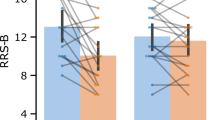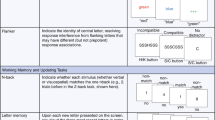Abstract
A TYPE of problem of estimation with which one meets in the theory of mental factors is this: a team of n tests zi (i = 1, 2.., n) has been analysed into r common factors foa (α = 1, 2, r) and n specifics f1i, all of which are normalized and uncorrelated, but otherwise unknown. The observed test-scores (in standard measure) can then, in matrix notation, be represented as follows. where the column vectors z, f0 and f1 indicate the tests, the common factors and the specifics respectively. The matrices M0 and M1 whose elements are the loadings of the tests with the hypothetical factors, are regarded as known. When it is desired to estimate the common factors in terms of the test-scores, the usual regression method leads to the formula: where &fcirc;0 is the estimate of f0.
This is a preview of subscription content, access via your institution
Access options
Subscribe to this journal
Receive 51 print issues and online access
$199.00 per year
only $3.90 per issue
Buy this article
- Purchase on SpringerLink
- Instant access to the full article PDF.
USD 39.95
Prices may be subject to local taxes which are calculated during checkout
Similar content being viewed by others
Author information
Authors and Affiliations
Rights and permissions
About this article
Cite this article
LEDERMANN, W. A Shortened Method of Estimation of Mental Factors by Regression. Nature 141, 650 (1938). https://doi.org/10.1038/141650a0
Issue date:
DOI: https://doi.org/10.1038/141650a0
This article is cited by
-
The effect of additional variables on factor indeterminacy in models with a single common factor
Psychometrika (1978)
-
A new method for analyzing aesthetic preferences: Some theoretical considerations
Psychometrika (1946)
-
Multiple rectilinear prediction and the resolution into components
Psychometrika (1940)



